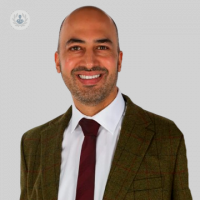What is multiple sclerosis, and how does it affect the body?
Escrito por:In one of our latest medical articles below, highly regarded consultant neurologist, Dr Yasser Falah, provides us with a comprehensive medical overview of multiple sclerosis.

What is multiple sclerosis, and how does it affect the body?
Multiple sclerosis (MS) is a chronic immune-mediated disease that affects the central nervous system (brain and spinal cord). The immune system attacks the myelin, a protective layer around nerve fibres, causing disturbance in the electrical impulses transmission and inflammation in the surrounding tissue. This makes it difficult for the brain or spine to send signals to the rest of the body.
What are the main symptoms of multiple sclerosis?
MS symptoms vary widely between patients, and they tend to depend on the location of the inflammatory changes. The main symptoms include paraesthesia (such as numbness, tingling, electric-shock sensations), weakness, fatigue, lack of coordination, unsteady gait, partial or complete loss of vision, double vision, vertigo, speech difficulty, cognitive problems, bowel and bladder dysfunction, problems with sexual function, and mood disturbances.
What causes the condition?
The exact cause of MS is unknown. However, the underlying process has been shown to be an immune system malfunction. The body’s immune system mistakenly attacks the myelin sheath around nerve cells. Once the myelin sheath is damaged, nerve signal transmission becomes slow or blocked. Sometimes, nerve damage may also occur. Genetics and environmental factors may also play a role.
What are the associated risk factors?
Some of the factors which have been shown to be associated with higher MS risk include: age, gender, family history, Epstein–Barr virus, low levels of vitamin D, smoking, and obesity.
Is there a cure for MS? How is it managed?
There is no known cure for MS. Disease modifying therapy drugs are available to control the disease, and sometimes slow progression in the majority of patients. In the situation of a disabling relapse, not caused by infection, steroids are prescribed to help patients improve and speed up recovery. There are also treatments which are given to relieve the symptoms regardless of the MS stage.
Stem cells therapy is used in minority of cases when high efficacy drugs do not control the disease. Allied healthcare professionals play an important role in managing MS patients. Physiotherapy helps maintain movement and assure safe mobility.
Occupational therapy is helpful in making adjustments at home and work space. A speech therapy team assist in managing patients with speech or swallowing difficulty.
To book an appointment with Dr Yasser Falah, you can do so via his Top Doctors profile today.


